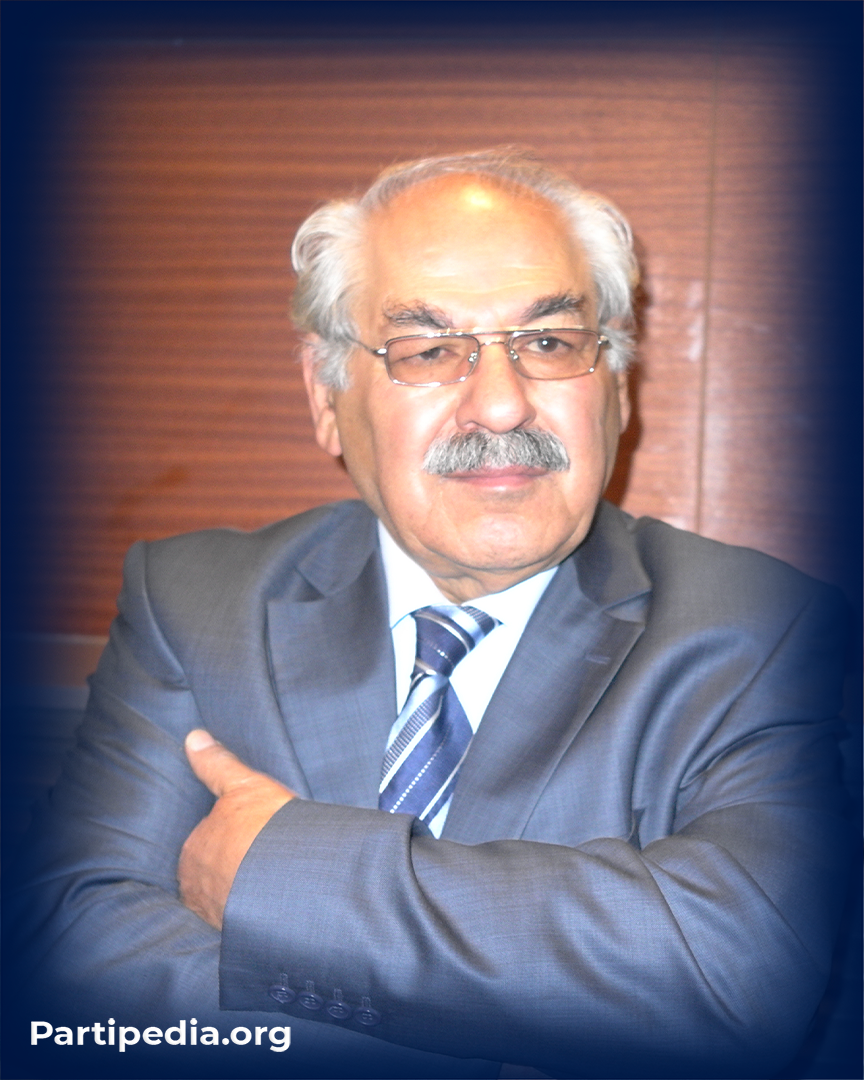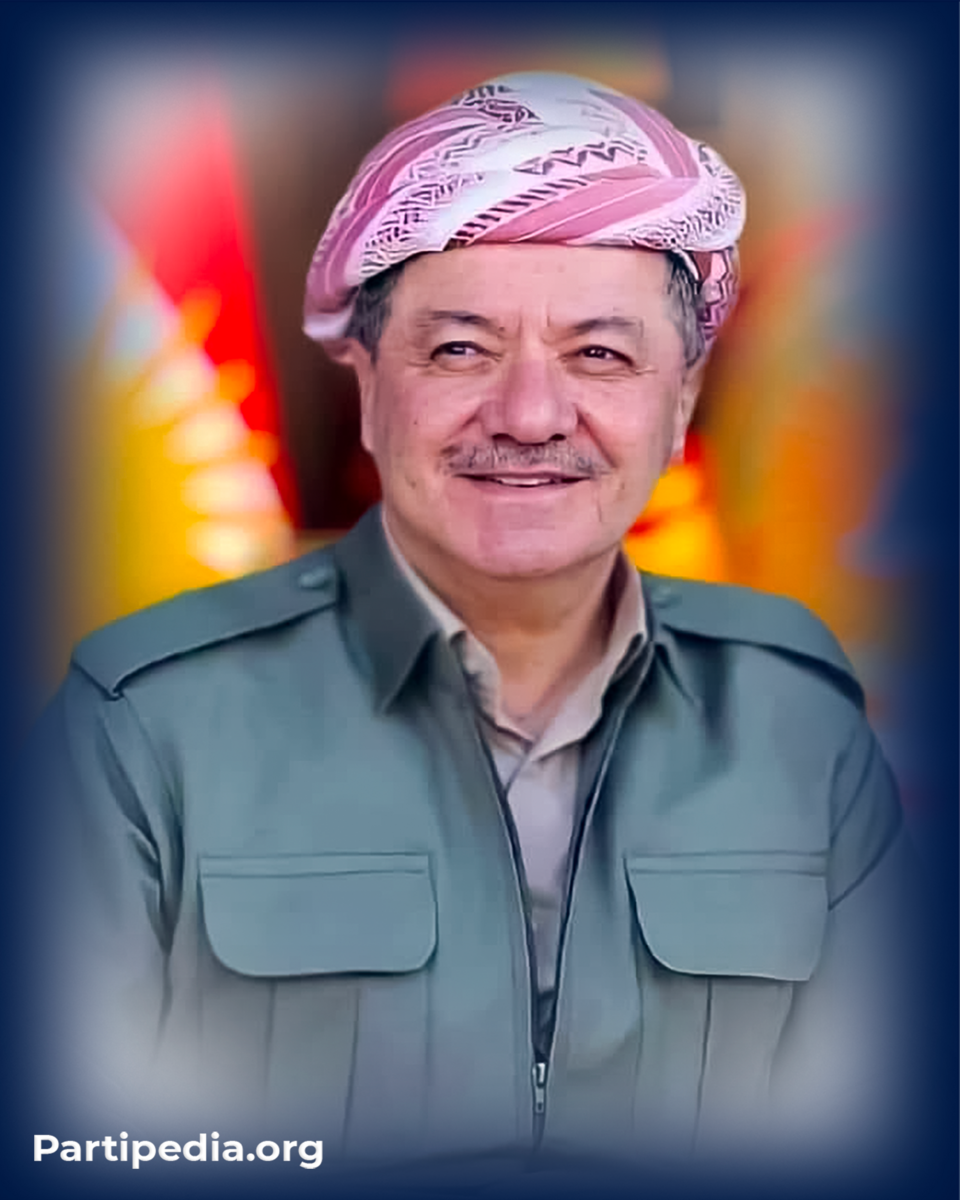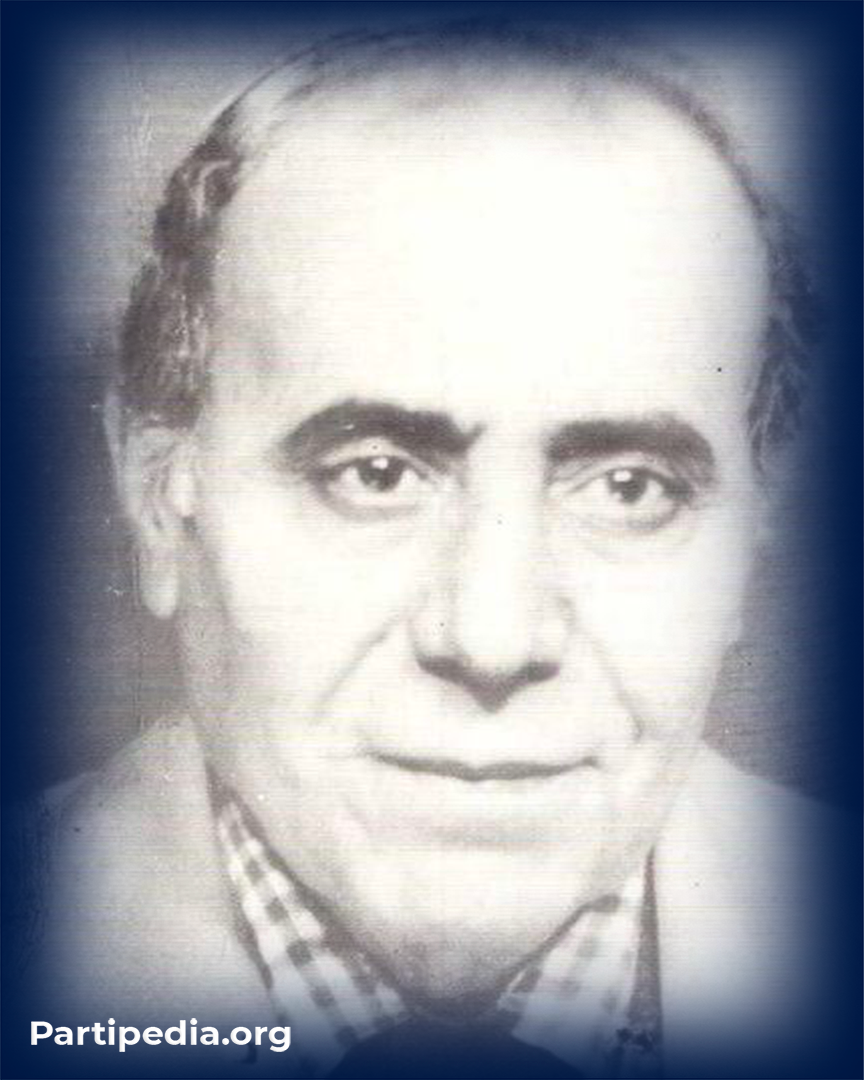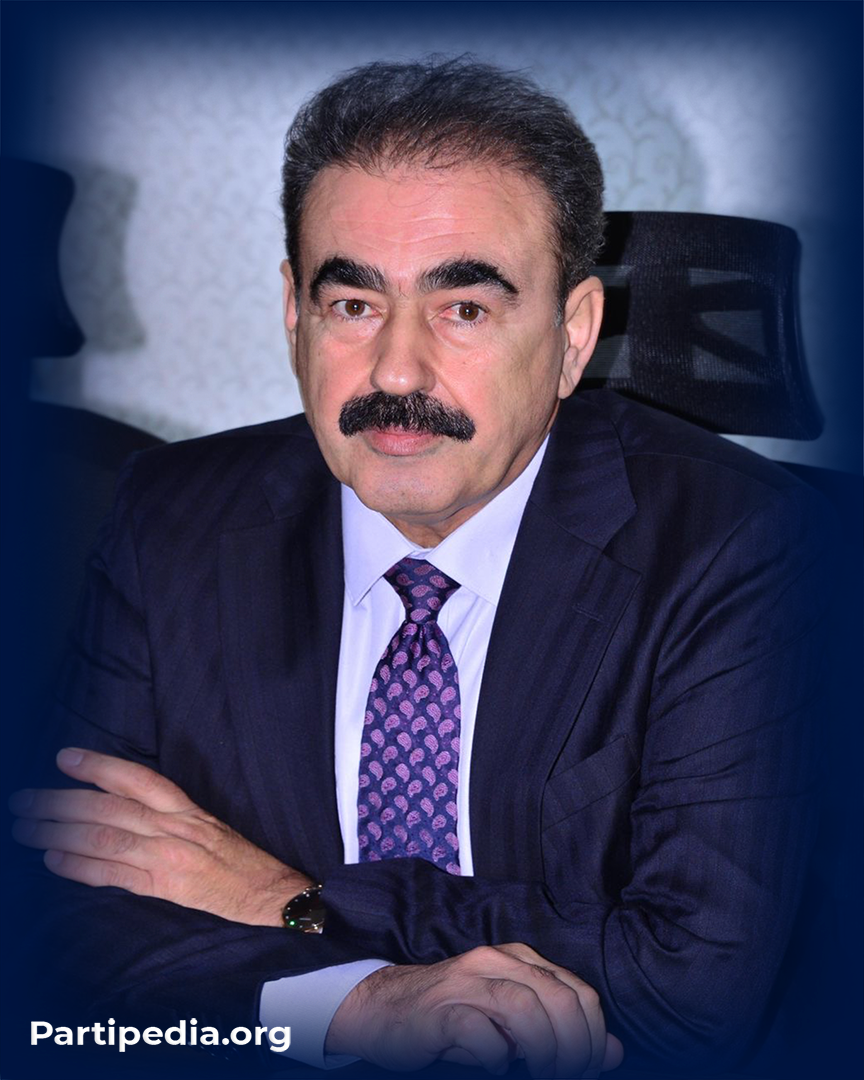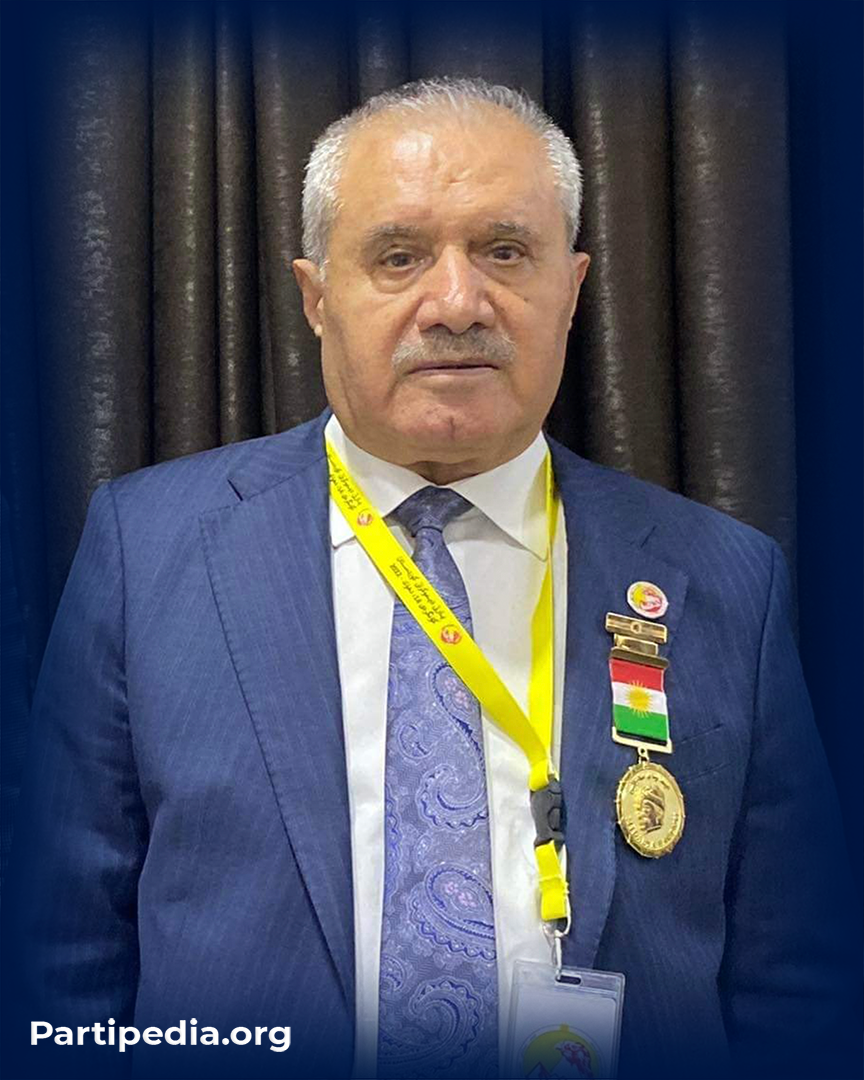Falakeddin Sabir Hamud Aziz, also referred to as Falakeddin Kakaei was a politician and writer born in 1943. He approached the Kurdistan Democratic Party (PDK) in 1965. He was elected as a member of the Kurdistan Democratic Party's (KDP) Central Committee in the ninth and tenth congresses in 1979 and 1989. He was appointed a member of the Kurdistan Democratic Party's (KDP) Political Bureau in 1985. He became a member of the Kurdistan National Assembly in 1992. He was appointed Minister of Culture in the Kurdistan Region's third cabinet in 1996, and in 1999, he was an advisor to the leader of the Kurdistan Democratic Party (KDP) the same year. He also possessed the Immortal Barzani medal. He spoke Arabic, Kurdish, Turkmen, Persian, and English fluently.
Biography
Falakeddin Kakeyi was born in Kirkuk in 1943. He practiced the Yarsan religion. He is a Sayyid (liege lord) of Mustafaei, the family of the Yarsan elders. His father, Sayyid Sabir Sayyid Hamud (1907 - 1988), was a tribal chief and poet. Falakeddin was a secondary school student in Kirkuk in 1957. In 1962, he published his first Kurdish short story under the pen name "Lau" in the Sulaimani-based newspaper "Vin." He married Wasfiya Rashad Sulaimani in 1964. He began writing in Arabic in magazines and newspapers the same year. In 1964, he was also admitted to Baghdad University's Department of Media.
Furthermore, in 1966, he published his first novel, Bitaqa Yansib (Lottery Ticket), in Arabic. In addition, in 1967, he contributed some of his writings to environmental protection and was known as an environmental activist. Between 1975 and 1991, following the fall of the "Aylul" Revolution, he moved to Iran as a refugee. He returned to Kurdistan after the Uprising and resided in Erbil. He passed on on Wednesday, July 31, 2013, and was buried in Pirmam.
Service Record
Falakeddin Kakeyi made contact with the Iraqi General Student Union in 1957. He was a member of the Iraqi Communist Party's Kirkuk Farmers Union in 1960. He graduated from high school (the scientific section) in 1962. In 1960, he was a member of the Iraqi Communist Party's Military Committee in Kirkuk. In 1965, he joined the Kurdistan Democratic Party (KDP), and in 1967, he worked as a writer and reporter for the Kurdistan Democratic Party (KDP) newspaper "Al-takhi," which was published in Arabic in Baghdad under the names (A. Parshang), Khidr Rasho, and Halaj.
On Monday, May 22, 1967, he published a speech under his real name in the Arabic newspaper "Al-takhi," and the following year, he published another speech under the name Alhlaj. In 1967, he was apprehended by Iraqi authorities. He published his first Arabic novel, "Bittaqa Yansib" (Lottery Ticket), the same year. He also made contact with the Peshmarga in 1967. In 1970, he was the secretary of writing for the newspaper "Al-takhi." Furthermore, in 1972, he was a member of the Arabic section of the magazine "Shams Kurdistan." In the same year, he was awarded by Idris Mustafa Sheikh Mohammed (1944 - 1987) also known as Idris Barzani as a mark of respect for his hard work and the significance of his life.
He signed a petition on March 31, 1974, as a writing secretary, against the Iraqi government's earlier occupation of the "Al-takhi" and "Brayati" newspaper's headquarters. He got in touch with the Peshmarga soldiers around 1974. He represented the Kurdish Writers Union in the Peace Palace Congress on April 18, 1974, which took place close to Choman in the district of Erbil. In addition, he served as the station's editor-in-chief for the radio program "Voice of Kurdistan" in 1974. He was on the Kurdistan Democratic Party's (KDP) Supervisory Committee at the Ninth Congress in 1979. He was chosen to serve on the Kurdistan Democratic Party (KDP) Central Committee that same year.
In late 1979, he wrote reports and speeches in both Arabic and Kurdish for the “Voice of Kurdistan” under the name of Sabir Hawal. In 1980, he was in charge of the media department of the Kurdistan Democratic Party (KDP). In 1981, he was teaching the seventh course of the Kurdistan Democratic Party (KDP) Cadres Institute in Razhani village of eastern Kurdistan. In 1981 – 1991he was firstly a member of the writers’ committee and later became editor-in-chief of the newspaper “Khabat” the organ of the Kurdistan Democratic Party (KDP) for the mountain period. In 1985, he was a member of the Political Bureau of the Kurdistan Democratic Party (KDP).
He taught the Jude Front and the flags of other nations at the eighth course of the Kurdistan Democratic Party (KDP) Cadres Institute in the Razhani area of eastern Kurdistan from 30 November 1985 to 3 April 1986. He joined the Iraqi Writers, Journalists, and Artists Association. In 1986, he was chosen to serve as the first director of the Kurdistan Front's press office in 1988. Under the name Sabir Ali Ahmad, he wrote "Al-Gaddafi wa al-qathiya al-kurdiya" in 1989. He was chosen as a member by the delegates of the 10th Congress to the Kurdistan Democratic Party's (KDP) Central Committee in 1989. And in late 1989, he served as the magazine's chief editor "Bang" the organ of the Kurdistan Writers Association.
In 1989, he wrote a speech for the Kurdistan Democratic Party (KDP) newspaper Khabat (Al-Nadal) under the name of Sabr Ahmad. On 13th January 1990, he was appointed in charge of Kurdistan Relations of the Kurdistan Democratic Party (KDP) and of the KDP's media department. In 1991, he was appointed by the Kurdistan Democratic Party (KDP) as a member of the preparatory committee for the Kurdistan National Assembly elections. On 15th-17th November 1991, he was elected as the vice-president of the Kurdish Writers Union by the representative of the seventh congress of Kurdish Writers union (Freedom Congress).
He taught media and human rights in the ninth course of the Kurdistan Democratic Party (KDP) Cadres Institute in Pirmam, Erbil province from 16 December 1991 to 18 February 1992. He served on the Kurdistan Democratic Party (KDP) election committee for the 1991 elections for the Kurdistan National Assembly. He became vice president of the Kurdish Writers Union in 1992. On the Kurdistan Democratic Party's slate, he was elected for the Kurdistan National Assembly in 1992. He served as the chairman of the relations committee and a member of the Kurdistan National Assembly's culture committee (First session) on July 7, 1992.
He served as the Yellow Faction's acting chairman in the Kurdistan National Assembly on July 22, 1992. He published a speech in the Kurdistan Democratic Party newspaper "Khabat" on Sunday, August 16, 1992. He served as editor-in-chief of the Kurdistan Democratic Party's (KDP) newspaper Khabat from 1993 to 2001.
In 1993, he was a member of the Preparatory Committee of the 11th Congress, and he was appointed chairman of the recommendations and decisions committee of the eleventh congress of the Kurdistan Democratic Party (KDP). On 22nd August 1993, he was elected as a member of the Central Committee of Inspection and Supervision of the Kurdistan Democratic Party (KDP) (11th Congress) by the representatives of congress. From 1993 to 2001, he was the editor-in-chief of the newspaper Khabat, the organ of the Kurdistan Democratic Party (KDP). On Monday, 18th October 1993, they were welcomed by President Massoud Barzani, accompanied by the Central Inspection and Monitoring Committee.
He had a piece published in the Arabic newspaper Al-Mu'tamr in 1993. He began writing "Gaddafi wa al-qathiya al-kurdiya" in late 1985 under the alias Saber Ali Ahmad; the book was prepared for publication in 1986 but was not released until 1989. At the Kurdistan Democratic Party (KDP) Cadre Institute in Erbil, he presented a seminar on Kurdistan parties to students in the tenth course in 1997. He was appointed Minister of Culture in the Kurdistan Region's third cabinet on September 26, 1996. He resigned from the Kurdistan National Assembly on September 23, 1997.
In the spring of 1999, he was appointed as the chairman of the preparatory committee of the 12th congress of the Kurdistan Democratic Party (KDP) and later as a member of the supervisory committee of the 12th congress of the Kurdistan Democratic Party (KDP). In 1999, he was an advisor to the Kurdistan Democratic Party (KDP) leader. On 15th May 1999, he was awarded the Immortal Barzani Medal by President Massoud Barzani for his struggle in the “Aylul” Revolution, “Gulan” Revolution, South Kurdistan Uprising and the sovereignty period. On 20th December 1999, he was sworn in before the Kurdistan National Assembly and was appointed Minister of Culture in the fourth cabinet. On Wednesday, 4th July 2000, he opened the Mukriani Publishing House in Erbil. On Tuesday, 30th January, 2001, he attended the second congress of the Kurdistan Union of Journalists in Erbil. On 15th August 2001, he resigned as the Minister of Culture of the Kurdistan Region. On 15th August 2001, he was appointed as the Kurdistan Regional Government Minister in the fourth cabinet. On Tuesday, 31st January 2001, he participated in the second congress of the Kurdistan Union of Journalists in the Media Hall of Erbil.
He was chosen to serve on the High Committee to Honor the Immortal Barzani’s 100th Anniversary in 2002. He was appointed to the Preparatory Committee for the Kurdistan National Assembly Elections on November 12, 2002. He traveled to Erbil, Iraq, with President Massoud Barzani to attend the Hazhar Mukriani Congress, which was hosted by the Kurdistan Regional Government's Ministry of Culture, from November 3–5. He acquired ownership of the "Basara" newspaper and "Nawshafaq" magazine in April 2003. After Saddam Hussein's regime (1937–2006) fell, he served as editor in chief of the third issue of the Arabic-language newspaper "Al-Takhi" from April 2003 to February 2005. He served as the Kurdistan General Congress of Journalists' representative in Erbil in 2003. He was named the Kurdistan Region's Minister of Culture on May 7, 2006. He served as the magazine's chief editor in 2009 for Turkology magazine. He owned the publication Turkology and served as president of the Kurdish-Turkish Brotherhood Association in 2010.
His works:
-
Bitaqa Yansib (Lottery Ticket) (First print – 1967) (Second print – 2008)
-
A Short Kurdish Theater - 1984
-
Doni Aram (1st edition 1984), (2nd edition 2007), translated from Persian into Kurdish by Russian novelist Mikhail Sholokhov.
-
About Education in Kurdistan and in the Mountains - 1985
-
The path of frontal work of the Kurdistan Democratic Party in Iraq (1975-1988) - 1988
-
Frontal Work Caravan -1985
-
How to Know Hatred - 1985
-
On Education in Iraqi Kurdistan - 1986
-
Gelek Be Rojnameh - 1988
-
People without Daily Newspaper - 1988
-
Al-Zamir, 1998, Part II
-
Gaddafi wa Al-qathiya Al-kurdiya (Mountain Edition - 1989), (First Edition - 2008), (Second Edition - 2015), under the name of Sabir Ali Ahmad published this work, (2nd edition -1991 ), (3rd edition - 2008).
-
Kaf Book - (1st Edition - 2001), (2nd Edition - 2013)
-
In its own color away from politics, (first edition, 2005), (second edition, 2015).
-
Al-Zamir, 2007, Part I
-
Runahi Zardasht - (2008 edition), (2nd edition - 2011), (3rd edition - 2015). In 2009, a translation of this work was published in Kurdish Kurmanji in Amed.
-
How They Teach You to Hate - 2010
-
Conscience and Freedom (1st edition 2007), 2nd edition 2010, 3rd edition 2015, first Vol.
-
Conscience.
-
Glass House for the Middle East (1st edition 2010), (2nd edition 2015).
-
Halajiyat (Iqza Mutwahja fi hithur alhalaj) - (First Edition - 2010), (Second Edition - 2015), translated into Kurdish by Sherzad Heini in 2014 and published under the title Halajiyat.
-
Celebration of Existence (First Edition 2010), (Second Edition 2015).
-
Bedari - (1st edition - 2010), (2nd edition - 2015).
-
Mutan al-Noor, (1st edition - 2010), (2nd edition - 2015).
-
Agayi - (1st edition - 2011), (2nd edition - 2015).
-
Lantha Alhkma – 2011. In 2014, it was translated into Kurdish by Sherzad Heini under the title Chrkasati Hoshmandi.
-
Spiritual Revolution (1st edition - 2010), (2nd edition - 2012), third edition - 2015), translated into Kurdish and published in 2016 by Sherzad Heini under the title Spiritual Coup.
-
Moment of Intelligence - 2014
-
Complete Works - Nine Volumes - 2015
-
Kobarham - Nine Volumes - 2015
-
The Hidden Secret - (First Edition - 2015), (Second Edition - 2016).
-
Lyman Taftah Azhar? - (1a3 January - 2012), (second edition - 2015), under the title Who do the flowers bloom for? Translated into Kurdish in 2016.
-
Rozhani Razhan Idris Piroza - 2016
-
Politics and Philosophy - 2019
-
Kurdistan and Neighboring States - 2019
-
Land Book.
Sources:
-
ئهرشیفی دهستهی ئینسكلۆپیدیای پارتی دیموکراتی کوردستان.
-
ئهرشیفی پارتی دیموکراتی کوردستان، فایلی ژماره FA-٥٩، دهقی چاوپێكهوتن لهگهڵ دكتۆر ناسیح غهفور ڕەمهزان لهلایهن حهمید سهعید، ههولێر، ٢ ئابی ٢٠١٨ز، ل ٦.
-
بهرههم عهلی و ڕێبوار محهمهد ...، كابینهی چوارهم و ئاسۆیهكی گهشتر بۆ پاشهڕۆژی كوردستان، ڕۆژنامهی برایهتی، ئۆرگانی پارتی دیموکراتی کوردستان، ژماره ٢٩٩٥، ههولێر، سێشهمه، ٢١ كانونی یهكهمی ١٩٩٩ز، ل ل ٥ ـ ٦.
-
برعایة رئیس حكومة كوردستان نقابة صحفيي كوردستان تعقد مؤتمرها الثاني، جریده حمرین، أعلام جمعیة الكورد الفیلیین، العدد ١٨، أربیل، كانون الثاني ٢٠٠١م، ص ١.
-
حامید گهوههری، میدالیای بارزانی بهرزترین خهڵاتی ڕیزلێنان، كتێبی یهكهم، چاپی دووهم، (ههولێر ـ دهزگای خێرخوازی بارزانی ـ ٢٠١٩ز)، ل ل ١٩١ ـ ١٩٣.
-
سهفهر ژاژۆكی، فهلهكهدین كاكهیی، پێشمهرگه و سیاسهتوان، ڕۆژنامهی خهبات ژماره(4853)، 5/8/2015.




